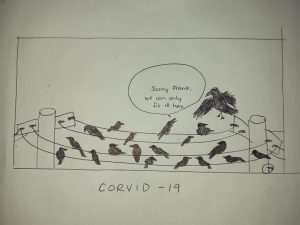I’m still working on the piece about strikes and organizing, but in the meantime here’s a link to a relevant story,
Garbage collectors from the Department of Environmental Services walked off the job on strike Wednesday morning, announcing their demands for improved protective equipment and hazard pay in response to the coronavirus, according to multiple reports.
and a CORVID-19 cartoon Tegan made a couple days ago:

Thanks to the COVID-19 outbreak, layoffs have increased, job interviews have been indefinitely postponed, and many places aren’t hiring new workers. All of that means I really need help paying my bills and keeping a roof over my head. Patreon.com is a way for you to help with that, even if it’s just a little bit, and get some perks and extra content in return. You control how much you give, and how long you give it, and every little bit really does help. When lots of people pitch in, it can make a huge difference. Please help if you’re able, and share my work with others. Thank you!


